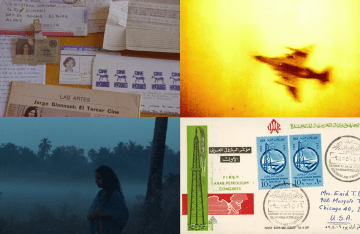
Non-Aligned Visions
- Public Trust
- 4017 Walnut Street Philadelphia, PA 19104
Join us at Public Trust on August 3, 2025 for an artist plenary from 6-7:30pm for "Non-Aligned Visions," a multimedia installation about contemporary artistic explorations of transnational solidarities from the 1960s and 1970s. The installation will be on display from August 3-8, 2025.
A roundtable discussion on August 3, 2025 from 6:00-7:30 pm will feature artists Carmen Amengual, Essa Grayeb, Suneil Sanzgiri, and Sanaz Sohrabi, moderated by scholars and installation organizers Sima Kokotović and Eszter Zimanyi. Seating is limited and available on a first-come, first-served basis. A reception for registered attendees of the Visible Evidence Documentary Studies conference will be held beforehand, from 5:00-6:00 pm. Presented by the Center for Advanced Research in Global Communication (CARGC) at the University of Pennsylvania in partnership with the Visible Evidence conference and Public Trust, with additional support from the Department of Cinema & Media Studies at the University of Pennsylvania.
About the Program
It has been seventy years since leaders from across the so-called Third World met in Bandung, Indonesia for the first prominent Asian-African Conference, planting seeds that would grow into the Non-Aligned Movement (NAM). Throughout the 1960s and 1970s, as the Cold War reached its apex, the fire of anti-colonial and anti-imperial revolutions across Africa, Asia, and Latin America forged new transcontinental solidarities, shaped by visions for an equitable, global redistribution of power and resources. New international initiatives, such as UNESCO, the New World Economic Order, and the Non-Aligned Broadcasting Organization, aimed to facilitate global equality across political, economic, and cultural arenas in the Global South. These visions for non-alignment, however, were themselves subject to internal divisions and debates which undermined NAM’s utopian aims for an egalitarian future.
By the early 1990s, the West’s triumph in the Cold War and the United States’s status as the global superpower was undisputed. As non-aligned internationalist initiatives became increasingly undermined, multi-national corporations and organizations like the World Bank and International Monetary Fund grew to prominence, weakening the sovereignty of postcolonial nation-states and ushering in the era of neocolonialism. Today, in 2025, we are living through global crises at unprecedent scales, from catastrophic fires, floods, heat waves, droughts, and air pollution to genocidal wars undergirded by unrelenting imperial ambitions.
Yet, there remains an infinity of traces of non-alignment—an infinity of other possible worlds and futures yet to be realized. Often hidden in basements and attics, or locked away in forgotten archives, these remnants contain kernels for imagining new worlds. Worlds we need now more than ever. Non-Aligned Visions is dedicated to these traces and the artistic practices that activate them, from militant Latin American filmmakers assembled in Algiers for the Third World Cinema Committee meeting; Arab filmmakers mourning the 1967 defeat of pan-Arabism; and cultural artifacts scattered across Iran, Syria, Algeria, and Venezuela that celebrate OPEC countries’ economic sovereignty.
These traces reconnect localities that were once united in their struggles for global justice; more than anything, and aligned with the work of Lisa Lowe, they recognize the necessity of exploring and “exposing the constructedness of the past” so as to release the present from a singular historical narrative. By excavating and investigating these largely forgotten trajectories and global intimacies, the artists featured in this installation assemble the inventories necessary for a critical engagement with, and elaboration of, our present conditions of life. At the same time, they push us to expand our imaginations of what kinds of political horizons are open to us and remind of us of the historical collective efforts that mobilized decolonization. Through this installation, we strive to amplify their efforts by exploring the capacities of moving images to offer different pathways that lead us beyond the horrors of our times.
About the Films
Carmen Amengual's A Non-coincidental Mirror (2024) is an ongoing film research that fabricates a memory of a forgotten event: the Third World Filmmakers Meetings. Held in Algiers in 1973, and Buenos Aires in 1974, the symposiums served as a hub where “third-world” filmmakers discussed the role of filmmaking in anti-colonial struggles, made agreements to support each other’s works, and strategized about how to produce films under dire political conditions. Out of these meetings, the conference organizers planned to film an educational documentary about the anti-colonial struggles in Africa to share with, and inspire, a Latin American audience. A Non-coincidental Mirror seeks to imaginatively reconstruct this venture and the documentary film that never materialized by experimenting with storytelling, documentary forms, and installation strategies.
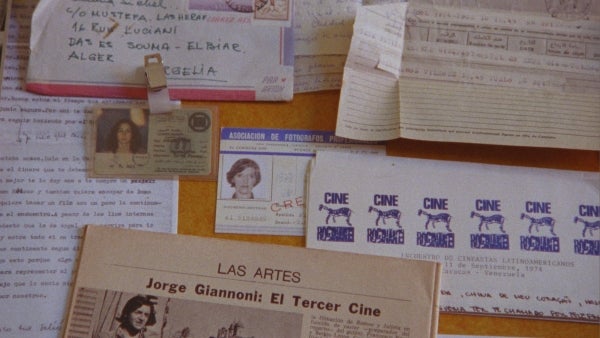
Essa Grayeb's The Return of Osiris (2019) revisits the events of June 9, 1967, when Gamel Abdel Nasser, then President of Egypt, appeared on the television and the radio to inform Egyptian citizens of their country’s defeat in the war and announce his resignation. For many, Nasser’s speech marked the doom of the Arab nationalist movements that he had led and inspired. Ironically, it was through his resignation that Nasser regained somewhat the lost ground as the Egyptian people rallied behind him, fervently demanding his continued leadership. The tumultuous demonstrations transformed his defeat into a resounding personal victory. Consequently, he chose to remain in office. The Return of Osiris weaves together footage extracted from numerous Egyptian films and television series produced between 1976 and 2016. The found footage was edited to reconstruct Nasser’s resignation speech according to the original text. Through the process of collecting, cataloging, and rearranging visual materials, the film weaves together popular culture’s representation of historical events. It offers a reflection on collective trauma while simultaneously interrogating the very essence of memory itself.
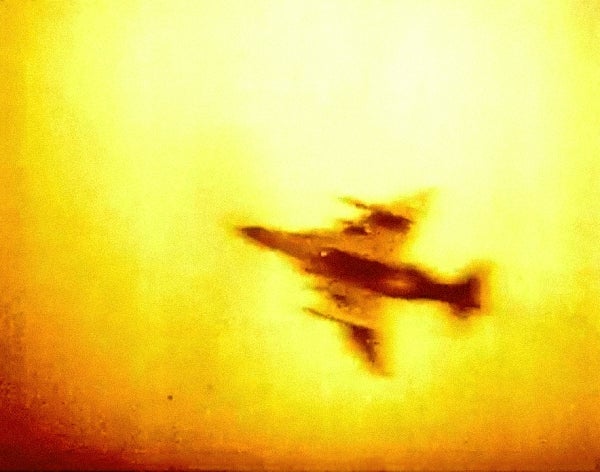
Suneil Sanzgiri's Two Refusals (Would We Recognize Ourselves Unbroken?) (2024) is an experimental film focuses on interwoven narratives around the mutual struggle against Portuguese colonialism between India and Africa and the bonds of solidarity that developed between the two continents. Told through a mix of interviews and fictional narratives, Two Refusals utilizes a blend of CGI animation, super 16mm film, hand-processed and destroyed archival film to uncover lost layers of world-building, kinship, and the material and immaterial network of relations that developed between historical figures in Goa, Mozambique, Angola, and Guinea-Bissau. A woman’s dreams become haunted by a mythological titan from Portuguese mythology called the Adamastor—a giant storm cloud formed on the Cape of Good Hope who sought to destroy Vasco de Gama’s ship and prevent him from ever reaching India. Repurposed from Portugal’s oldest work of epic poetry, Os Lusíadas, the Adamastor becomes a figure of refusal but also of failure to ultimately pose the question, “What could have been?”
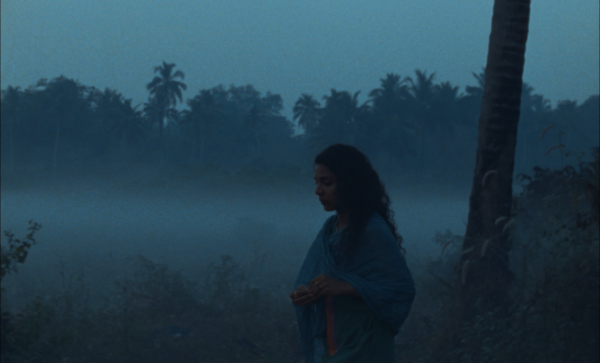
Sanaz Sohrabi's An Incomplete Calendar (2025) is a mixed media project that explores the formation of the Organization of Petroleum Exporting Countries (OPEC) in 1960 as the first international oil alliance from the Global South. OPEC was celebrated by its members as an anchor for national sovereignty over natural resources and a new path for national development. Its geopolitical influence was deeply intertwined with other coterminous decolonial projects and political currents between 1960-1980 such as the Arab Petroleum Congress (Cairo 1959) and Non-Aligned Movement. Energy sovereignty as a catalyst for cultural production during this period has remained largely unexamined. In this experimental video and spatial installation, Sohrabi draws on archival examples such as promotional films and newsreels produced by OPEC to chart out how oil’s evolving visual cultures were mobilized to connect diverse national publics across geographical borders in the era of raw material sovereignty.
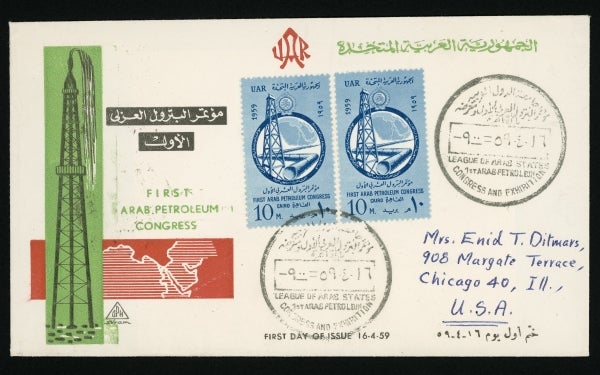
About the Artists
Carmen Amengual is an interdisciplinary artist, independent researcher, and filmmaker from Argentina. Her work explores the emergence of collective imaginaries, identity formations, and conceptions of time and history that shape political imagination. She has presented her projects in exhibitions and conferences both nationally and internationally and is a recipient of the Vera List Center artist fellowship and a 2024 Creative Capital Award.
Essa Grayeb is a Palestinian visual artist and scholar whose work spans video, photography, and installation. His practice often involves appropriating and manipulating existing objects, footage, and sounds, weaving between reality and fiction. His work reflects on the shifting relationship between images, histories, and collective memory.
Suneil Sanzgiri is an Indian American artist, researcher, and filmmaker. Spanning experimental video and film, animations, essays, and installations, his work contends with questions of identity, heritage, culture, and diaspora in relation to structural violence and anticolonial struggles across the Global South. Sanzgiri’s films offer sonic and visual journeys through family history, local mythology, and colonial legacies of extraction in Goa, India—where his family originates.
Sanaz Sohrabi is a researcher of visual culture and an artist-filmmaker. Working with essay film and installations, she explores the shifting and migratory paths of images, situating them within a continuum of their historical relations and archival temporalities. Sohrabi is currently working on a feature-length documentary that maps an unlikely geopolitical calendar of political affinities, competing and contradictory national projects wherein oil was both the agent of imperial power and the catalyst for anticolonial political projects.
Events
View AllDisclaimer: This event may be photographed and/or video recorded for archival, educational, and related promotional purposes. We also may share these video recordings through Annenberg's website or related platforms. Certain events may also be livestreamed. By attending or participating in this event, you are giving your consent to be photographed and/or video recorded and you are waiving any and all claims regarding the use of your image by the Annenberg School for Communication. The Annenberg School for Communication, at its discretion, may provide a copy of the photos/footage upon written request.
